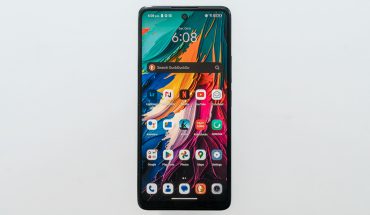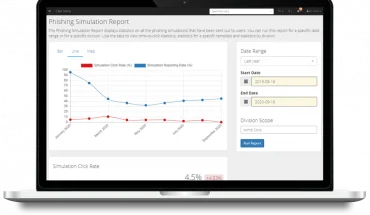It’s not surprising that data and dating are intimately linked these days.
Many of the leading dating app companies are making full use of artificially intelligent algorithms and optimized machine learning techniques as they unite member feedback, accumulated usage statistics, and gathered digital insights to improve the quality of their product and enhance the dating experience of their members.
With revenues in the online dating market expected to hit $3.15 billion (USD) this year, and continued growth rates pushing that figure up by hundreds of millions of dollars per year over the next few years, there are several companies playing the market – plenty, uhh, fish in the sea, as they say.
That’s just one of several popular dating apps out there: Hinge, Tinder, Bumble, Facebook Dating, and YourMoveAI are others. As that latter name implies, artificial intelligence is being used by many of them to not just monetize matchmaking but enhance the experience for all involved.
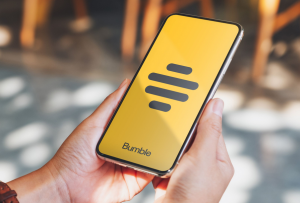
Bumble, now celebrating in tenth year on the dating scene, has been among the leaders in utilizing new technologies like AI, in its application.
Bumble, now celebrating its tenth year on the dating scene, has been among the leaders in utilizing new technologies like AI, and it’s now making another move with enhanced features being rolled out in a major update and rebrand of the product. The release is being treated like the birthday party it is, with major ad campaigns (in Canada) across out-of-home billboards, social media platforms, and TV.
Bumble is like other dating apps with a familiar swipe right on a person’s profile (if you like what you see) or swipe left technique.
But unique to the app is its underlying premise that puts women in charge.
From its inception, Bumble has sought to empower women on the dating scene, giving them the tools to steer the experience by letting them make the first move – in potential heterosexual match-ups, guys cannot start the conversation. (In same sex dating, either party may start the ball rolling.)
Giving women that added control over their dating lives has long been seen by Bumble as a way to flip traditional gender roles and challenge some old-fashioned dating ideas that can inhibit some women from participating.

In November 2023, Bumble founder Whitney Wolfe Herd announced she would take on the role of executive chair in January 2024, with Lidiane Jones stepping into the CEO position. “Passing the baton of being the CEO to a woman I deeply admire, respect, and believe in, is nothing short of a dream come true for me. Women making (first) moves, together, is what this company is all about. Lidiane joining us is the result of a very thoughtful and strategic succession planning process, that will allow me to get back to my founder roots, driving our mission forward, and innovating. I founded this company nearly a decade ago for women to be equals in their relationships, and to help make the internet a kinder place.” Image via LinkedIn.
Bumble was one of the first dating apps built with women at the centre of its philosophy, and that’s due in no small part to its founder, Whitney Wolfe Herd. A former Vice President of Marketing at Tinder (another online dating company she helped launch), Herd was CEO and is now Executive Chair of the Board at Bumble, having recently handed over CEO duties to another female tech exec, Lidiane Jones.
Taking the original Making the First Move concept that underpinned Bumble’s dating methodology, Bumble says it is now giving women even more agency in how they connect with a new Opening Moves feature that lets them choose a recommended opening or create their own question, one that potential matches can respond to. It’s seen as a new way to engage with new connections while keeping the woman in control.
“We have always believed that when you make dating better for women, you make it better for everyone,” Lidiane Jones said when unveiling the new app features. “In listening to our community, many have shared their exhaustion with the current online dating experience, and for some, that includes making the first move. We’re also hearing from women that empowerment today is not only about control but it’s also about agency, and we’re excited to offer more choice in how women make the first move with our new Opening Moves feature.”
In dating, just getting started can be a challenge, so having the option to craft that trigger line can make the first move more comfortable, if not rewarding. During testing, Bumble says it saw how Opening Moves improved meaningful conversations by increasing chat initiation and reply rates, often lengthening the overall time spent in conversation.
Of course, timing is everything (in dating as well as comedy): with many dating apps, that first connection or match will be available, like forever. On Bumble, though, there’s a 24-hour window during which a connection must respond to that opening, or else the match expires.
In addition to that opening line option, Bumble has updated its app to let people describe their Dating Intentions and better share and describe just what they are looking for in a date, for now or for the future.
The new dating descriptions include ‘fun, casual dates’ and ‘intimacy without commitment’ as well as ‘life partner’ and ‘ethical non-monogamy.’ And different dating intentions (up to two) can be chosen. Knowing someone’s dating intentions is clearly important, online or not. Many women say they struggle with people not being upfront and open about their intentions online.
And sussing out those intentions is where AI can come in, as Jones described. Bumble uses AI and machine learning to identify scams, spam, and fake profiles. “Bumble has been leading in addressing the challenges of online spaces, introducing industry-first features like Private Detector to identify unsolicited lewd images, and comprehensive Community Guidelines. This latest launch reflects… our continued commitment to making dating better for women, creating space for people to establish relationship dynamics that work for them.”
Bumble has also been updating its matchmaking capabilities with AI, as senior product manger Dara Alsulayman described in a company video release:
“[W]e’ve been looking at our algorithm and updating it with new machine learning optimizations to make sure that curated profile recommendations are really in line with what our members are looking for. We’ve also incorporated a lot of our member feedback and a lot of the data and insights that we’ve been seeing.”
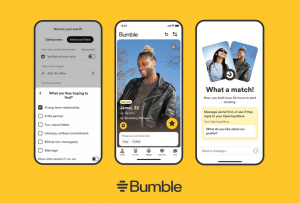
Up to four images can now be used in a Bumble profile, and personal interests, activities and causes can be described as a way to be more open about personal characteristics and dating intentions.
She added that Bumble profiles have been enhanced with the option to describe personal qualities and traits and qualities that are important to people, along with a section where community-minded people can express the causes that motivate and activate them.
Up to three options can be picked, and of course, feminism is one. It’s another example of how the company, the app, and the founder have been buzzing from the start about the need and ability to empower women to make the first move and make their own choices.
Like choosing a level of service: while many basic dating features are free in online dating apps, added features and functionality often come with a cost (apps make money through advertising, subscriptions and new or special feature add-on fees). At Bumble, one service level, called Boost, starts at $14.99 (CDN) for a seven-day period; Bumble Premium starts at $34.99 for 7 days. Prices can vary by location, and certain special functions may be priced individually.
As with pretty much any mobile device or loaded application, users need to be aware of data privacy and security intentions as well.
Although a general location is important to getting a date, Bumble says it does not share exact location of its members with the community. Privacy assessments and evaluations of various dating apps have revealed some concerns about location tracking, data sharing and relationships with third-party companies. Tech firm (and browser maker) Mozilla reported that as many as 80 per cent of dating apps may sell or share personal information for advertising purposes, and its previous reports on the topic noted concerns with some app developers’ privacy statements, including Bumble’s, which does warn users that data may be collected and shared in certain circumstances.
Yes, data and dating are kind of a thing now.
# # #
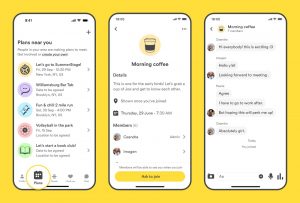
Many basic features are free in online dating apps, while some added features and functionality often come with an added cost.
-30-


